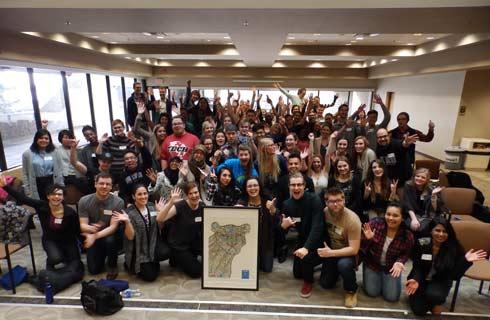- IDP China>
- 课程库>
- 其它>
- 跨学科研究>
- 神经科学>
- Doctor of Philosophy in Neuroscience - Cognition and Cognitive Neuroscience
心理学哲学博士-认知与认知神经科学
Doctor of Philosophy in Neuroscience - Cognition and Cognitive Neuroscience

学历文凭
Ph.D.

专业院系
Department of Psychology

开学时间

课程时长

课程学费

国际学生入学条件
IDP—雅思考试联合主办方

雅思考试总分
7.0
- 雅思总分:7
- 托福网考总分:88
- 托福笔试总分:570
- 其他语言考试:NA
CRICOS代码:
申请截止日期: 请与IDP联系 以获取详细信息。
课程简介
The Cognition and Cognitive Neuroscience (CCN) program marshals the talents of over 30 faculty in Psychological Sciences at Vanderbilt to examine fundamental problems in perception, attention, memory, thinking, and problem solving. Specialties within these broad areas of research include:<br><br>View list of Cognition and Cognitive Neuroscience faculty here<br><br>Visual Perception (binocular vision, motion perception, object recognition, perception of geometric structure, perceptual learning and expertise, scene perception, change detection, perceptual development)<br>Attention and Performance (focused attention, dual-task performance, executive control, task switching, and automatization)<br>Concepts and Categories (categorization, conceptual structure, knowledge representation)<br>Thinking and Reasoning (causal reasoning, analogical problem solving, decision making, numerical reasoning, thinking with diagrams, metacognition)<br>Perception and Action (perceptual-motor coordination, development of reaching)<br>Spatial Cognition (spatial vision, spatial memory and orientation)<br>Learning and Memory (learning in real-world contexts, perceptual learning and expertise, explicit/implicit learning)<br>The Cognitive Bases of Emotion and Emotional Experience (emotion elicitation, facial expression of emotion, vocal expression of emotion)
相关申请
 预科
预科 奖学金
奖学金 实习机会
实习机会 在校学习
在校学习 跨境学习
跨境学习 校园授课-线上开始
校园授课-线上开始 在线/远程学习
在线/远程学习
开学时间&学费
学费信息仅供参考,请与IDP联系以获取详细信息
| 开学时间 | 时长 | 学费 | 地点 |
|---|
学校排名

世界排名121
数据源:
泰晤士高等教育世界大学排名
关于范德堡大学

严格学术问题的前提美国范德堡大学要求男生在观看足球比赛时穿西装、打领带,女士佩戴珍珠,并且要求一名异性同伴。虽然在一次赛事上不必满足所有的要求,但美国范德堡大学已经将南部的优雅和现代社会的态度成功结合在了一起。设立于1875年的honor code管理的所有学术活动,也使得范德堡的学生可以在没有监考的情况下进行考试。 这里几乎所有的人都可以找到自己想要的东西和美国的音乐之城毗邻,这里有蓝调、乡村和摇滚音乐以及各式各样的餐馆、剧院和出售自制啤酒的酒馆,从校园步行即可到达。乡村音乐粉丝们绝对不应该错过的是这里的名人纪念堂。纳什维尔的边界之外是大雾山、提供野炊设施的州立公园、美丽的湖泊和冬天滑雪场。最好的公路旅行线路包括到孟菲斯(埃尔维斯的家乡)、新奥尔良(参加狂欢节)、路易斯维尔(肯塔基州赛马会)和亚特兰大。
本校相关课程
其他相关课程

心理学哲学博士-认知神经科学
 滑铁卢大学
滑铁卢大学学历文凭
Ph.D.
开学日期
课程费用总额


行为神经科学理学学士
 劳伦森大学
劳伦森大学学历文凭
Bachelor Degree with Honours
开学日期
课程费用总额


心理学和神经科学哲学博士
 达尔豪斯大学
达尔豪斯大学学历文凭
Ph.D.
开学日期
课程费用总额


神经科学理学学士
 达尔豪斯大学
达尔豪斯大学学历文凭
Bachelor Degree
开学日期
课程费用总额


神经科学理学硕士
 渥太华大学
渥太华大学泰晤士高等教育世界大学排名:188
学历文凭
Masters Degree
开学日期
课程费用总额


神经科学哲学博士
 渥太华大学
渥太华大学泰晤士高等教育世界大学排名:188
学历文凭
Ph.D.
开学日期
课程费用总额










 美国
美国





